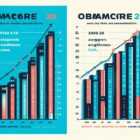How Policy Shifts Influence Obamacare Enrollment

If you’ve ever wondered how policy shifts affect Obamacare enrollment, then this article is for you.
From the impact of Medicaid expansion to changes in insurance marketplaces, the influence of policy decisions on enrollment numbers is undeniable.
With ongoing repeal and replacement efforts and adjustments to subsidies, it’s crucial to understand how these shifts can shape the future of healthcare.
Get ready to dive into the objective, analytical, and informative exploration of how policy changes influence Obamacare enrollment.
Key Takeaways
- Medicaid expansion under Obamacare has significantly increased the number of people enrolled in Obamacare and reduced the number of uninsured individuals.
- Changes in insurance marketplaces, including the expansion of options and increased competition among insurance companies, have led to improved benefits and more affordable options for consumers.
- Repeal and replacement efforts of Obamacare have resulted in uncertainty and confusion, impacting enrollment numbers.
- The individual mandate played a significant role in encouraging people to enroll in health insurance plans and balance risk pools, and its elimination could potentially lead to imbalanced risk pools.
Impact of Medicaid Expansion
If you qualify based on income, you can enroll in Medicaid thanks to the expansion under Obamacare. Medicaid expansion has had a significant impact on Obamacare enrollment, providing access to affordable healthcare for millions of low-income individuals and families. Prior to the expansion, Medicaid eligibility was limited to specific groups, such as pregnant women, children, and disabled individuals. However, under the Affordable Care Act, states were given the option to expand Medicaid to include all adults with incomes up to 138% of the federal poverty level.
The expansion of Medicaid has played a crucial role in increasing the number of people enrolled in Obamacare. By expanding Medicaid, more individuals who previously fell through the cracks of the healthcare system now have access to comprehensive coverage, including preventive care, hospital visits, and prescription medications. This has resulted in a significant reduction in the number of uninsured individuals, as Medicaid expansion has provided a safety net for those who can’t afford private insurance or don’t have access to employer-sponsored coverage.
According to a study by the Kaiser Family Foundation, states that expanded Medicaid saw a much larger decline in uninsured rates compared to states that didn’t expand. Additionally, the study found that Medicaid expansion was particularly beneficial for low-income adults, minority populations, and individuals with chronic conditions. The expansion has also had positive economic impacts, with increased federal funding flowing into states that expanded Medicaid, leading to job growth and revenue generation.
Changes in Insurance Marketplaces
In the evolving landscape of Obamacare enrollment, you can navigate the changes in insurance marketplaces with ease. As policies shift and regulations fluctuate, being informed about the alterations in these marketplaces is crucial. Here are some key points to consider:
- New Insurance Options: With changing policies, insurance marketplaces have expanded, offering a wider range of plans for consumers to choose from. This includes both private insurance options and government-sponsored plans like Medicaid and CHIP.
- Enhanced Benefits: The changes in insurance marketplaces have led to improved benefits for consumers. Many plans now offer essential health benefits, such as preventive care, maternity care, and mental health services, which weren’t previously included in all plans.
- Increased Competition: In response to policy shifts, insurance companies are entering and exiting the marketplaces, leading to increased competition. This competition can drive down costs and provide consumers with more affordable options.
- Navigating Enrollment: With the changes in insurance marketplaces, it’s important to navigate the enrollment process effectively. This includes understanding enrollment periods, eligibility requirements, and the different plans available in your area.
Repeal and Replacement Efforts
As policies shift and regulations fluctuate, you can navigate the changes in insurance marketplaces with ease, including the ongoing efforts to repeal and replace Obamacare.
The repeal and replacement of the Affordable Care Act, also known as Obamacare, has been a contentious issue in U.S. politics. Since its inception, there have been several attempts by lawmakers to dismantle the healthcare law and implement alternative plans. These efforts have resulted in uncertainty and confusion for many Americans seeking health insurance coverage.
One of the main arguments for repealing and replacing Obamacare is the belief that it has led to rising healthcare costs and limited choices for consumers. Proponents of this view argue that by repealing the law, market forces will be unleashed, leading to increased competition among insurers and lower premiums for individuals. On the other hand, opponents of the repeal and replacement efforts argue that doing so would result in millions of Americans losing their healthcare coverage and could lead to a return to the pre-Obamacare era of high uninsured rates.
The ongoing debate and uncertainty surrounding the future of the healthcare law have had an impact on enrollment numbers. Some individuals may be hesitant to enroll in health insurance plans due to the uncertainty surrounding the future of the law. Others may choose to forgo insurance altogether, believing that the law will be repealed and replaced. This has the potential to impact the stability and affordability of the insurance marketplaces.
In the subsequent section, we’ll explore the relationship between the individual mandate and enrollment numbers, and how policy shifts have influenced the decision of individuals to enroll in health insurance plans.
Individual Mandate and Enrollment Numbers
To understand how policy shifts influence Obamacare enrollment, it’s important to examine the impact of the individual mandate on enrollment numbers. The individual mandate, which required individuals to have health insurance or pay a penalty, played a significant role in encouraging people to sign up for coverage. Here are two key ways in which the individual mandate affected enrollment numbers:
- Increased awareness and motivation: The individual mandate created a sense of urgency among individuals to obtain health insurance coverage. Knowing that they’d face a financial penalty if they didn’t comply, many people were driven to enroll in Obamacare plans.
- Balancing risk pools: The individual mandate helped to balance the risk pools by requiring healthy individuals to participate in the healthcare system. This ensured that there were enough healthy people enrolled to offset the costs of covering those with pre-existing conditions. Without the individual mandate, there’s a concern that the risk pools could become imbalanced, leading to higher premiums for everyone.
Understanding the impact of the individual mandate on enrollment numbers provides valuable insights into the dynamics of Obamacare.
Now, let’s explore the effects of subsidy adjustments on enrollment.
Effects of Subsidy Adjustments
Now let’s delve into how subsidy adjustments impact Obamacare enrollment.
Subsidies play a crucial role in making health insurance more affordable for individuals and families. When subsidies are adjusted, it can have both positive and negative effects on Obamacare enrollment.
When subsidies are increased, it provides individuals with more financial assistance to help cover the cost of their health insurance premiums. This can incentivize more people to enroll in Obamacare plans, as it reduces the financial burden of obtaining coverage. Increased subsidies can also help lower-income individuals gain access to affordable health insurance, which may lead to higher enrollment rates among this population.
On the other hand, when subsidies are decreased or eliminated, it can make health insurance less affordable for some individuals. This may discourage them from enrolling in Obamacare plans, especially if the cost becomes prohibitive. Consequently, lower subsidies can result in lower enrollment rates.
It is important to note that the impact of subsidy adjustments on Obamacare enrollment can vary depending on other factors, such as changes in the individual mandate or the availability of alternative insurance options. Additionally, the effects may differ across different demographic groups and states.
Understanding the effects of subsidy adjustments on Obamacare enrollment is crucial for policymakers and stakeholders. By carefully analyzing these impacts, policymakers can make informed decisions to ensure that health insurance remains accessible and affordable for all Americans.
Frequently Asked Questions
How Does the Expansion of Medicaid Affect Individuals Who Do Not Qualify for the Program?
The expansion of Medicaid affects individuals who do not qualify for the program by creating a gap in coverage. These individuals may struggle to afford health insurance and may be more likely to remain uninsured.
What Are Some Potential Consequences of Changes in Insurance Marketplaces for Consumers?
Potential consequences of changes in insurance marketplaces for consumers include limited coverage options, increased premiums, and confusion during open enrollment periods. These shifts can cause frustration and financial strain, leaving individuals uncertain about their healthcare options.
Are There Any Alternative Options Being Considered in the Repeal and Replacement Efforts of Obamacare?
Are there alternative options being considered in the repeal and replacement efforts of Obamacare? Yes, there are various proposals, such as expanding health savings accounts and allowing insurance to be sold across state lines.
How Does the Individual Mandate Impact the Overall Enrollment Numbers in Obamacare?
The individual mandate requires you to have health insurance or face a penalty. This influences overall enrollment in Obamacare by incentivizing more people to sign up, leading to higher enrollment numbers.
How Do Subsidy Adjustments Affect the Affordability of Health Insurance Plans for Low-Income Individuals?
Subsidy adjustments can affect the affordability of health insurance for low-income individuals. These shifts in policy can impact the amount of financial assistance available, making it either more or less affordable for those who qualify.



